Celebrity News
Marc Lamont Hill Claps Back at Bill O'Reilly 10 Times
Analyzing heated exchanges, witness Marc Lamont Hill's relentless pursuit of truth and accountability as he confronts Bill O'Reilly's biased reporting.
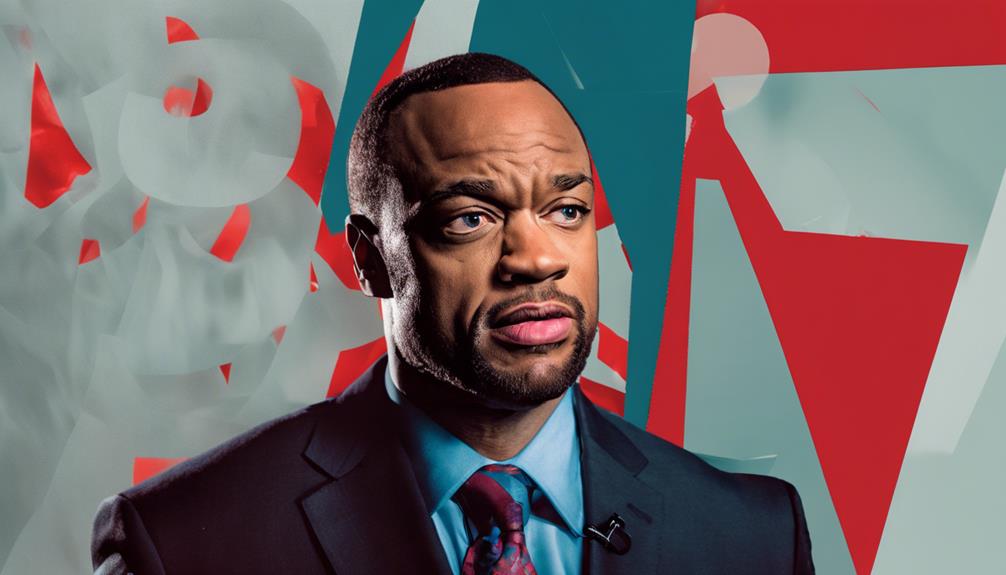
Marc Lamont Hill has consistently challenged Bill O'Reilly's biased reporting, criticizing his lack of objectivity and promotion of divisive narratives. Hill has confronted O'Reilly's racism, debunked his misinformation on Christmas, and corrected his historical inaccuracies. He has also addressed O'Reilly's Islamophobia, advocated for police reform, and promoted social justice and equality. Hill has further challenged O'Reilly's sexism and gender discrimination, holding him accountable for his harmful rhetoric. Through his critiques, Hill has demonstrated a commitment to accuracy, fairness, and inclusivity, and to understanding the complexities of social issues. As you explore these instances, you'll gain insight into the importance of critical thinking and responsible media representation.
Key Takeaways
• Marc Lamont Hill criticizes Bill O'Reilly's biased reporting on race issues, accusing him of lacking objectivity and promoting a conservative agenda.
• Hill challenges O'Reilly's notion of a 'War on Christmas', emphasizing the secular roots of Christmas and its commercialization.
• Hill confronts O'Reilly's harmful comments on racism, refusing to let them slide and showcasing his commitment to addressing prejudice.
• Hill corrects O'Reilly's historical inaccuracies, challenging his narratives on the Civil War and founding fathers.
• Hill debunks harmful stereotypes perpetuated by O'Reilly about Islam, confronting biased media representations and addressing hate speech against Muslims.
Hill Calls Out O'Reilly's Bias
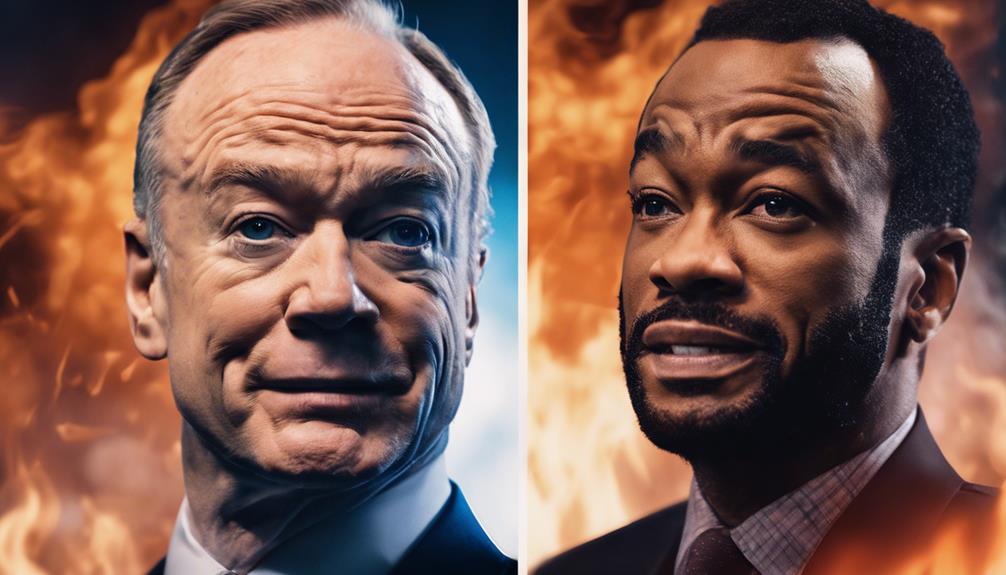
Frequently, Marc Lamont Hill has chastised Bill O'Reilly for his biased reporting on race issues, accusing him of lacking objectivity and pushing a conservative agenda.
Hill has been vocal about O'Reilly's tendency to promote divisive narratives on his show, often at the expense of marginalized communities. He's pointed out O'Reilly's history of inflammatory remarks, which have sparked outrage and concern among many.
Hill has challenged O'Reilly's credibility as a fair and balanced commentator, citing numerous instances of biased journalism. By doing so, Hill aims to hold O'Reilly accountable for perpetuating harmful stereotypes and promoting divisive rhetoric.
Through his critiques, Hill seeks to promote a more nuanced understanding of race issues, untainted by O'Reilly's conservative bias. Hill's critiques have sparked important conversations about the role of media in shaping public discourse and the need for more objective reporting.
Debunking the War on Christmas

Marc Lamont Hill has consistently challenged Bill O'Reilly's notion of a 'War on Christmas,' and in doing so, has brought attention to the secular roots of Christmas, highlighting how the holiday has evolved over time.
He's also emphasized the commercial co-optation of Christianity, arguing that the true spirit of the holiday season has been lost amidst the chaos of consumerism.
Secular Roots of Christmas
Hill argues that the 'War on Christmas' narrative overlooks the holiday's rich secular heritage, which has been shaped by centuries of cultural exchange and commercialization. By examining the secular roots of Christmas, Hill aims to debunk the idea of a war against the holiday. He emphasizes that Christmas has evolved over time, incorporating various cultural customs and traditions, not just religious aspects.
To illustrate this, Hill points to the following examples:
- Yule logs: Originating from ancient pagan festivals, the Yule log symbolizes the warmth and light of the winter solstice.
- Gift-giving: This tradition has its roots in ancient Roman festivals, where gifts were exchanged during the festival of Saturnalia.
- Decorative trees: The modern Christmas tree tradition has its roots in 16th-century Germany, where trees were decorated with fruits, nuts, and candles.
Christianity's Commercial Co-Opt
As the holiday season unfolds, the true meaning of Christmas is often overshadowed by a multibillion-dollar industry that capitalizes on the holiday's spiritual significance.
Marc Lamont Hill has been vocal about the commercialization of Christmas, challenging Bill O'Reilly's narrative of a 'War on Christmas.' Hill argues that the holiday has been co-opted by commercial interests, erasing its religious significance in favor of profit. He emphasizes the need to separate the true meaning of Christmas from the commercial aspects that dominate the holiday season.
Hill critiques the exploitation of Christmas for profit, highlighting the ways in which the holiday has been reduced to a mere marketing opportunity. By shedding light on the complexities of the holiday season, Hill's discussions with O'Reilly have sparked important conversations about the importance of preserving the spiritual essence of Christmas.
Hill's critiques have resonated with many, who feel that the commercialization of Christmas has gone too far. As Hill notes, 'The commercialization of Christmas isn't just about selling products, it's about selling a false narrative of what the holiday is about.'
Holiday Seasonal Traditions
Beyond the commercialized façade of Christmas, the holiday season is a tapestry of diverse traditions, and Marc Lamont Hill argues that embracing this cultural richness is key to debunking the notion of a 'War on Christmas'.
By acknowledging and respecting the various cultural and religious traditions that coexist during the holiday season, Hill emphasizes the importance of cultural inclusivity.
Here are three examples of diverse holiday traditions:
- Kwanzaa: A week-long celebration honoring African American culture and heritage, observed from December 26 to January 1.
- Hanukkah: An eight-day Jewish festival of light, commemorating the rededication of the Temple in Jerusalem during the Maccabean Revolt.
- Las Posadas: A nine-day Mexican celebration, reenacting the journey of Mary and Joseph as they searched for shelter in Bethlehem.
Standing Up to Racist Remarks
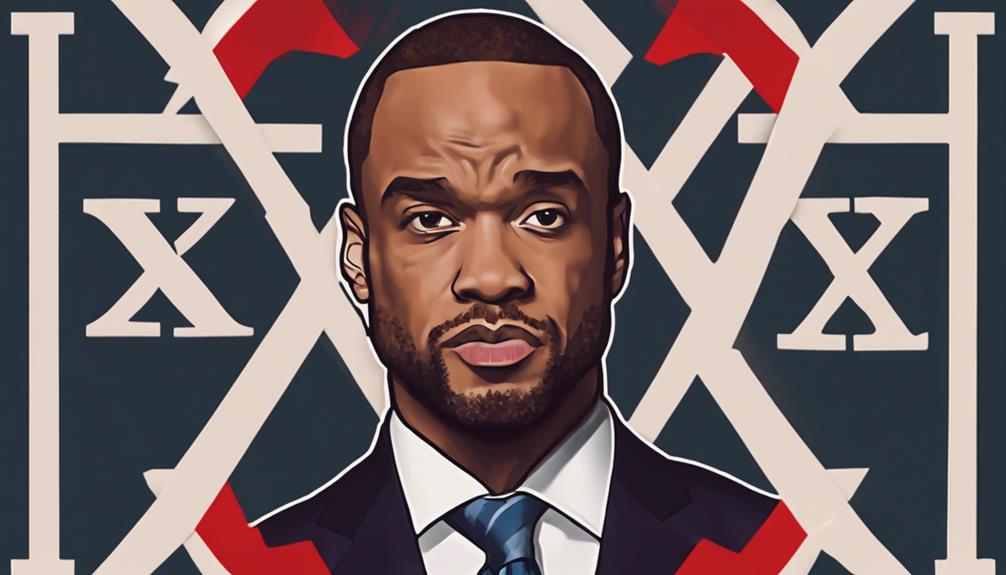
Confronting racism head-on, Marc Lamont Hill refused to let Bill O'Reilly's harmful comments slide, calling him out for perpetuating discriminatory ideologies. Hill's bold stance against O'Reilly's racist remarks showcased his commitment to addressing and challenging prejudice and discrimination. By directly addressing O'Reilly's racist statements, Hill demonstrated his willingness to speak out against injustice and bigotry on a public platform.
| Racist Remarks | Marc Lamont Hill's Response |
|---|---|
| Stereotyping a racial group | Hill called out O'Reilly for perpetuating harmful stereotypes |
| Discriminatory language | Hill denounced O'Reilly's language as racist and harmful |
| Downplaying systemic racism | Hill highlighted the importance of acknowledging and addressing systemic racism |
Hill's pushback against O'Reilly's racist statements exemplifies his dedication to confronting and dismantling harmful stereotypes and biases. By refusing to tolerate racism from O'Reilly, Hill demonstrated his commitment to creating a more inclusive and equitable society.
Correcting O'Reilly's Historical Facts
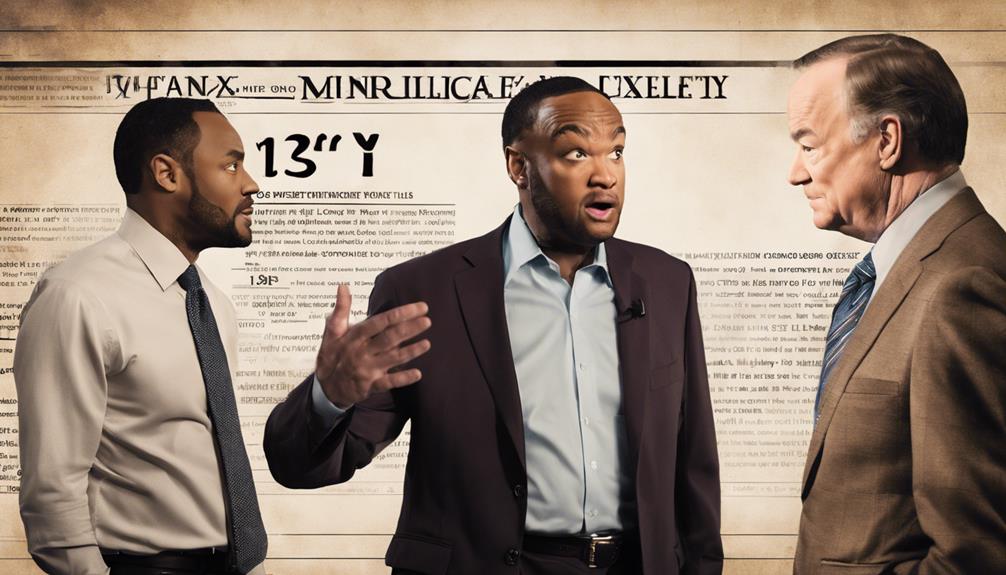
Ten instances of historical inaccuracy were corrected by Marc Lamont Hill, who took Bill O'Reilly to task for his misrepresentations of American history. Hill's commitment to accuracy and scholarly analysis enabled him to debunk O'Reilly's claims, providing a nuanced and factual perspective on historical events.
Some notable corrections included:
- Challenging O'Reilly's Civil War narrative: Hill refuted O'Reilly's assertions, offering a more accurate account of the war's causes and consequences.
- Reframing the founding fathers' legacy: Hill provided historical context, highlighting the complexities and contradictions of the founding fathers' roles in shaping America's past.
- Rethinking race relations in America: Hill challenged O'Reilly's simplistic narrative, offering a more nuanced exploration of the complexities and challenges of race relations in America.
Through his corrections, Hill demonstrated his expertise and dedication to setting the record straight, ensuring that American history is represented accurately and honestly.
Hill Challenges Islamophobia Claims
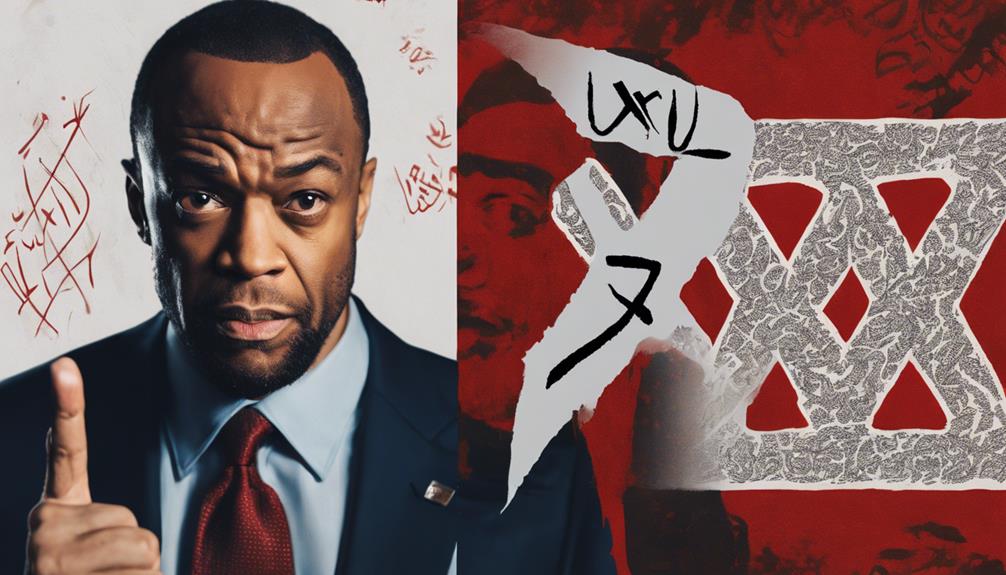
As Marc Lamont Hill challenged Bill O'Reilly's Islamophobia claims, he tackled three key areas: debunking harmful stereotypes, confronting biased media representations, and directly addressing hate speech.
Through his responses, Hill demonstrated a commitment to promoting tolerance and understanding.
Debunking Islamophobic Stereotypes
By targeting the misconceptions perpetuated by Bill O'Reilly, Marc Lamont Hill takes an important step in debunking Islamophobic stereotypes, emphasizing the multifaceted nature of the Muslim community. Hill challenges the notion that Islam is inherently violent or extreme, highlighting the peaceful nature of the majority of Muslims.
Three key aspects of Hill's approach include:
- Separating extremists from the majority: Hill emphasizes the need to distinguish between peaceful Muslims and extremist groups, promoting a more nuanced understanding of the religion.
- Countering generalizations with accurate information: By providing factual information, Hill counters O'Reilly's claims, promoting respectful discourse and understanding.
- Fostering inclusivity and acceptance: Through his discussions on Islamophobia, Hill aims to combat prejudice and promote a more inclusive and accepting society.
Challenging Media Bias Claims
Marc Lamont Hill addresses the media's role in perpetuating Islamophobic stereotypes by emphasizing the importance of fair and accurate representation of Muslims. He argues that biased portrayals have serious consequences, such as perpetuating discrimination and prejudice. By actively challenging these stereotypes and misinformation about Islam and Muslims, Hill believes that promoting understanding and inclusion can be achieved. Diverse and inclusive media representations, he suggests, foster empathy and respect, countering the harmful effects of perpetuating stereotypes that fuel hatred and violence.
This emphasis on combating Islamophobia through media representation highlights the power of accurate portrayals in shaping societal perceptions and promoting a more inclusive and respectful discourse.
Confronting Hate Speech Head-On
Confronting Bill O'Reilly's Islamophobia claims head-on, Hill vigorously disputed the TV host's harmful stereotypes and hate speech during a heated debate. Hill challenged O'Reilly's use of hate speech and pushed back against harmful stereotypes, showcasing his commitment to tackling discrimination and promoting understanding.
In this intense exchange, Hill demonstrated his willingness to address controversial topics head-on, advocating for marginalized communities and fighting against hate speech. Here are a few key takeaways from the confrontation:
- Unwavering commitment: Hill's response to O'Reilly demonstrated his dedication to promoting understanding and combating discrimination.
- Challenging harmful stereotypes: Hill pushed back against O'Reilly's harmful stereotypes, highlighting the importance of nuanced understanding and empathetic dialogue.
- Advocating for marginalized communities: Hill's response showcased his commitment to advocating for marginalized communities and promoting their voices.
Through this confrontation, Hill reinforced his reputation as a vocal advocate for marginalized communities and a fierce opponent of hate speech.
Unpacking Systemic Racism Denials
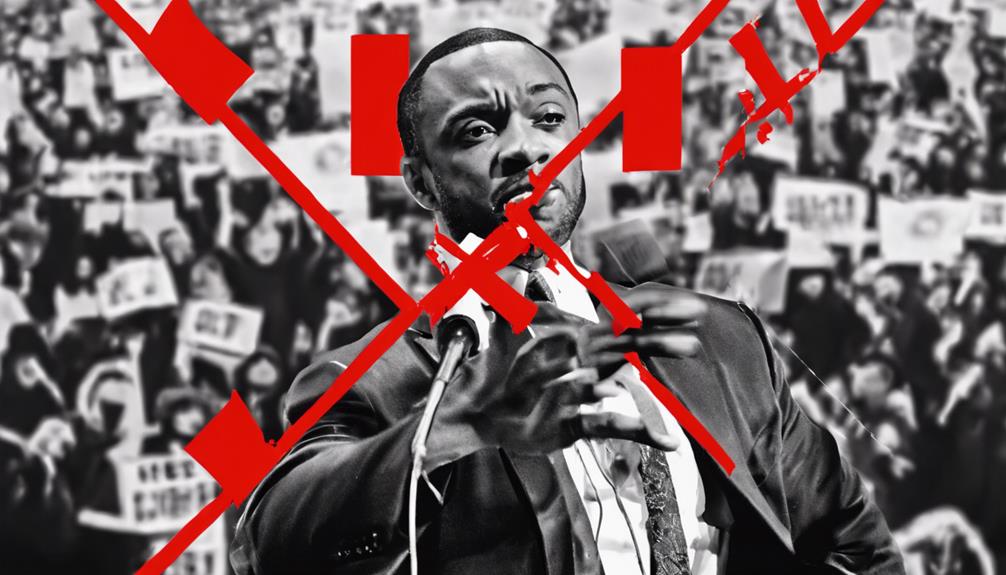
Systemic racism denials, like Bill O'Reilly's, often rely on a flawed assumption that racial disparities in the criminal justice system are merely a result of individual failures rather than a product of deeply ingrained biases. Marc Lamont Hill confronted O'Reilly's denial, pointing out the disproportionate incarceration rates of Black Americans as evidence of systemic racism. Hill emphasized that racial disparities in sentencing and police treatment can't be dismissed as individual failures, but rather are indicative of a deeply flawed system.
Refuting O'Reilly's Police Brutality Take
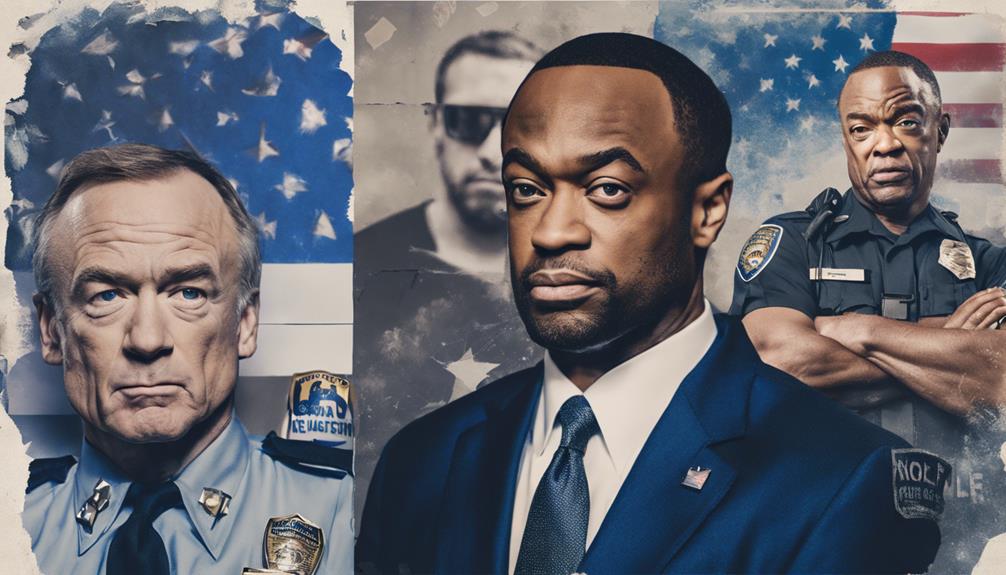
Police brutality, a pervasive issue disproportionately affecting communities of color, became a contentious topic when Bill O'Reilly downplayed its significance, prompting Hill to refute his stance with evidence-based arguments. Hill emphasized the need for police accountability, highlighting the devastating consequences of unchecked police brutality on marginalized communities.
Hill's response was rooted in data and personal experiences, showcasing the imperative for systemic reform. He underscored the importance of addressing the root causes of police violence, rather than dismissing its severity.
Key takeaways from Hill's refutation include:
- Systemic issues: Hill stressed the need to address the underlying systemic problems contributing to police brutality, rather than blaming individual officers.
- Disproportionate impact: He emphasized the disproportionate effect of police violence on communities of color, contradicting O'Reilly's downplaying of the issue.
- Accountability and reform: Hill advocated for meaningful reforms and justice for victims, emphasizing the importance of accountability in preventing future instances of police brutality.
Setting the Record Straight on Race
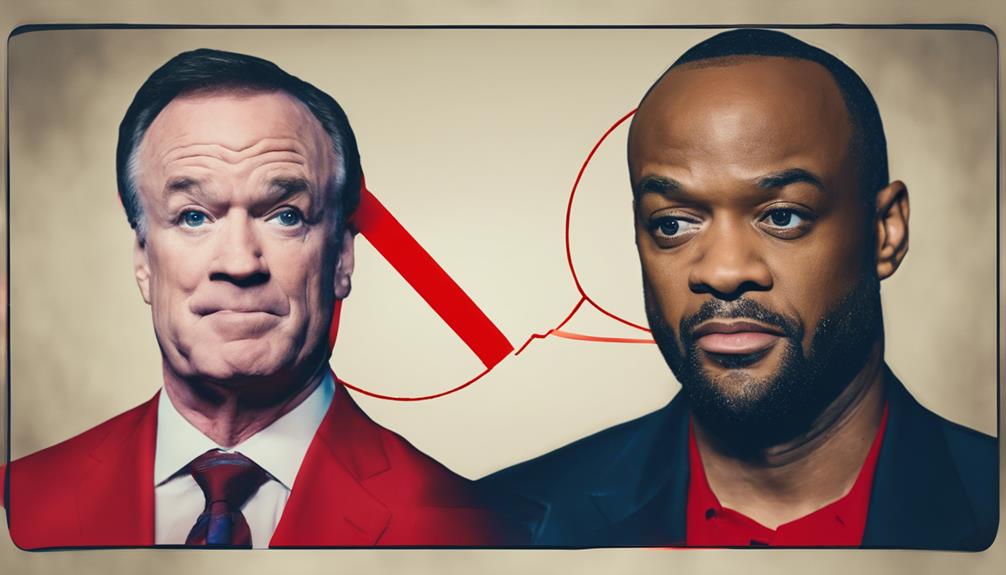
Marc Lamont Hill has consistently challenged Bill O'Reilly's views on race, emphasizing the harsh realities of racial profiling and the systemic injustices that perpetuate inequality.
Through their debates, Hill has shed light on the often-overlooked experiences of marginalized communities, highlighting the need for accountability and reform.
Racial Profiling Realities
Racial profiling, a pervasive issue in modern society, has led to a disproportionate number of minorities being stopped, searched, and arrested, highlighting the urgent need for reform. Marc Lamont Hill has consistently emphasized the harsh realities of racial profiling, challenging Bill O'Reilly's views and shedding light on the discriminatory practices faced by people of color.
Hill has pointed out that racial profiling isn't only unconstitutional but also perpetuates a cycle of mistrust between law enforcement and minority communities. He argues that it's essential to address the root causes of racial profiling, including biases and stereotypes, to create a more just and equitable society.
Some alarming statistics highlighting the realities of racial profiling include:
- Black people are 3.7 times more likely to be arrested for marijuana possession than white people, despite similar usage rates.
- Latino drivers are 30% more likely to be pulled over by police than white drivers.
- African Americans are 2.5 times more likely to be killed by police officers than white people.
Systemic Injustice Exposed
Systemic injustice permeates every layer of the criminal justice system, perpetuating racial disparities that disproportionately affect communities of color. Marc Lamont Hill emphasizes that this isn't a mere coincidence, but rather a result of deliberate policies and practices that perpetuate discrimination.
Hill confronts Bill O'Reilly's dismissive attitude towards racial profiling and discrimination, advocating for social justice and equality. He debunks O'Reilly's claims about race relations, emphasizing the need to address systemic racism and inequality.
Hill's arguments are rooted in data, highlighting the disproportionate impact of mass incarceration on communities of color. He sheds light on the racial disparities in the criminal justice system, exposing the need for reform. Through his debates with O'Reilly, Hill amplifies the voices of marginalized communities, pushing for a more equitable society.
Confronting O'Reilly's Sexism Comments
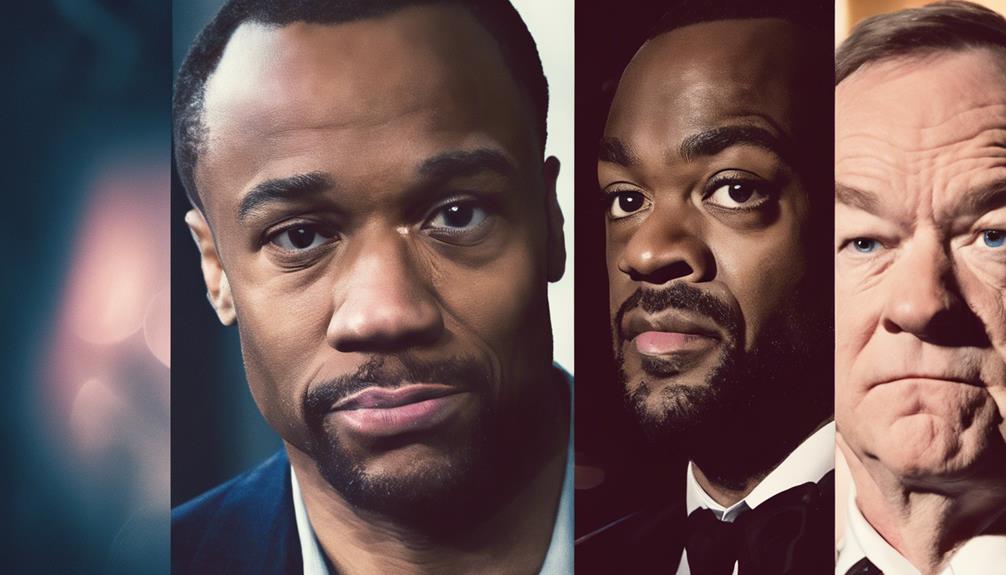
As Bill O'Reilly's sexist remarks sparked outrage, Hill swiftly confronted the TV host, underscoring the imperative of respecting women in media and challenging derogatory attitudes that perpetuate harmful gender stereotypes. Hill's swift response emphasized the need for inclusive and respectful discourse, highlighting the importance of gender equality in media representation.
In confronting O'Reilly's sexism, Hill:
- Highlighted the impact of derogatory language on women's self-esteem and participation in public discourse.
- Challenged harmful stereotypes perpetuated by O'Reilly's comments, emphasizing the need for nuanced and respectful representations of women.
- Advocated for equal treatment of women in media, promoting a culture of respect and inclusivity.
Through his responses, Hill demonstrated his commitment to advocating for gender equality and challenging discriminatory attitudes. By engaging in a public debate with O'Reilly, Hill showcased his dedication to promoting respectful discourse and challenging harmful stereotypes.
Hill Shuts Down O'Reilly's Whining
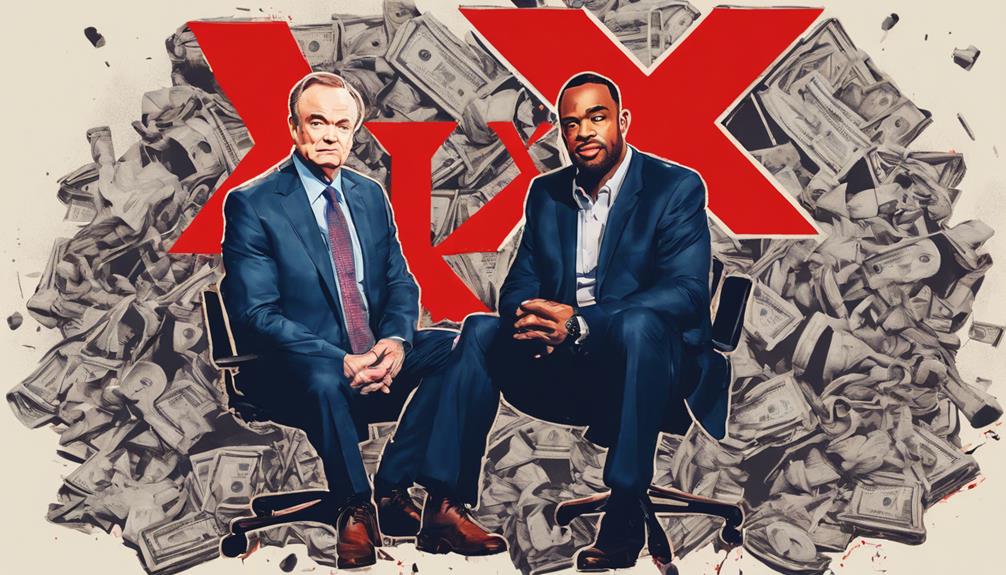
When Bill O'Reilly complained about his show's cancellation, Marc Lamont Hill swiftly countered by reminding him of his own high-profile exit from Fox News. Hill pointed out the hypocrisy in O'Reilly's claims of being a victim of "cancel culture," given his own history of controversial statements and behavior.
| Accountability | O'Reilly's Actions | Hill's Response |
|---|---|---|
| Sexual Harassment Allegations | Multiple settlements and allegations | "You can't cry victim when you've been accused of harassment" |
| Controversial Statements | Made sexist and racist comments | "Your words have consequences, Bill" |
| Lack of Accountability | Blamed others for his own mistakes | "You need to take responsibility for your actions" |
| Victim Complex | Claimed to be a victim of cancel culture | "You're not a victim, you're a perpetrator" |
Hill emphasized the importance of holding powerful figures like O'Reilly accountable for their actions and words. By highlighting O'Reilly's past controversies, Hill shut down his claims of being a victim and instead painted a picture of a man who has consistently refused to take responsibility for his actions.
Frequently Asked Questions
What Happened to Lamont Hill?
After making controversial comments about Israel at the United Nations, Marc Lamont Hill was fired from CNN in 2018. Despite the backlash, he continues to be a prominent voice in media, hosting shows and writing books.
His commitment to social justice issues remains unwavering, and he maintains a strong presence as a commentator and activist. Hill's dismissal from CNN didn't deter his passion for advocacy, and he continues to be a vocal advocate for Palestinian rights.
Conclusion
To sum up, Marc Lamont Hill's exchanges with Bill O'Reilly exemplify the importance of critically examining biased narratives.
For instance, during a 2016 debate, Hill disputed O'Reilly's assertion that there's a 'war on cops,' citing FBI data that shows a decline in police officer fatalities.
Hill's fact-based approach highlights the need for nuanced discussions, encouraging viewers to think critically about the information presented to them.
Celebrity News
J.D. Vance Didn’t Have Sex with a Couch, Still Odd
Explore the curiosities surrounding J.D. Vance, an unconventional figure who sparks interest beyond unfounded rumors.

Every day, the political world brings weird surprises. Yet, some stories catch us off guard with their strangeness. J.D. Vance’s case is one of them, revolving around a bizarre couch meme. It started from a tiny remark in his memoir, twisted into humor by Twitter user @rickrudescalves. This joke turned into a huge debate, filled with doubt and laughter. Despite clear evidence against it, the idea that Vance got too close to couch cushions spread wide. This tale shows how memes can twist political talks. As we get ready for the intense 2024 election, Vance’s couch story is a weird reminder. It shows that online rumors can grow big, mixing truth and lies.
Key Takeaways
- The J.D. Vance rumor gained traction on July 15, 2023, starting from a tweet by @rickrudescalves.
- The claim references his memoir, “Hillbilly Elegy,” yet is largely a humorous exaggeration.
- Memes proliferated on platforms like TikTok, demonstrating the virality of internet culture.
- The Associated Press published and then retracted an article debunking the rumor.
- Vance’s extreme views parallel the humor and absurdity surrounding his politically charged persona.
The Origin of the Rumor
A strange idea started from a tweet by @rickrudescalves on July 15. It said J.D. Vance did something weird with a couch. This idea turned into a well-known meme about J.D. Vance. The meme got big because it showed what’s funny and strange about internet jokes today. It even joked about Vance’s book, *Hillbilly Elegy*, but none of it was true. Social media can make fake stories seem real, especially about famous people.
The Meme Culture and Social Media Impact
Memes can be funny but also misleading, especially in politics. They can make people believe things that aren’t true. The J.D. Vance couch meme showed how powerful social media is. Simple jokes can become big topics that everyone talks about. This mix of humor and rumors can change how we see people, especially during elections.
Details of the Rumor and its Spread
The first tweet pointed to pages in *Hillbilly Elegy* with no mention of a couch incident. Yet, the story grew and mixed with Vance’s bold opinions on social issues. The Associated Press tried to clear things up with an article. But strangely, the article disappeared in a day. This shows how hard it is to keep facts straight when memes and rumors spread fast on the internet.
| Rumor Details | Findings |
|---|---|
| Origin of the Meme | Tweet by @rickrudescalves on July 15 |
| Reference in *Hillbilly Elegy* | No mention of sexual acts with a couch |
| Associated Press Response | Published article debunking the rumor |
| Article Removal | Removed within 24 hours |
| Presence of “couch” in memoir | 10 mentions, no sexual context |
| Other Statements by Vance | Known for extreme views on various topics |
Fact-checking the Couch Saga
Recently, a strange rumor about J.D. Vance made fact-checking in the media crucial. Snopes and the Associated Press worked hard to check these claims. Their efforts showed how vital true journalism is in fighting false news.
The Role of Snopes and Associated Press
Snopes, a site that fights urban legends and false information, found no truth in the charges against Vance. The Associated Press announced he was not involved in those activities. Yet, they had to take back their story due to mistakes in their process. This incident shows why it’s key for news groups to check facts well. Even small mistakes in headlines can spread the wrong information.
The Consequences of Misleading Headlines
Misleading headlines can change how people see things. The quick effort to report on Vance caused confusion and made false ideas stronger. Media outlets, without meaning to, pushed these untrue stories by being too sensational. It’s important for news to be careful in their reporting. Doing so keeps the public’s trust and prevents false beliefs. Clear fact-checking is crucial for keeping people well-informed.

J.D. Vance Didn’t Have Sex with a Couch. But he’s still extremely weird.
J.D. Vance’s story is more than just rumors. It ties into serious political issues. The couch joke shows how we mix humor with concerns about his political acts. We’re looking at how odd claims against Vance match his past.
Understanding the Context of the Meme
Vance didn’t do anything wrong with a couch. But, the tale highlights how people view him; funny, yet serious. His words and deeds have made him a figure of debate. The couch joke is a mix of fun and critique of who he is in politics.
Past Controversies and Statements by Vance
Vance has made bold statements that spark debate. He backed overturning the 2020 election and supported those involved in the January 6 event. Vance suggests big changes in government, raising questions about his democratic values. His ties to past issues and certain leaders show his provocative standpoint.

From doubting Trump to becoming his strong supporter, Vance has changed a lot. His change fuels stories about him, especially by Democrats against Republicans for elections. With the 2024 elections coming up, the couch joke stays relevant. It captures the weird and serious sides of Vance’s stance.
The Cultural Significance of the Rumor
The rumor about J.D. Vance and the couch is a key example of today’s political talk. It shows how political jokes shape what we think of leaders. Through memes and jokes online, the silly rumor becomes a big topic. This shows how people view politicians now.
What It Reveals About Political Discourse
This event shows that political jokes often mix with serious talk. As Vance moves forward politically, the jokes about the couch rumor show how we see him. This laughing matter marks a big change in reviewing public figures. People now mix humor with doubts in serious talks.
Humor and Ridicule in Modern Politics
In today’s world, political humor is an important tool. Memes quickly spread jokes about J.D. Vance. This humor is a way to deal with political worries. People create funny images and videos. This blend of fun and critique sparks conversations about politicians and their choices.

| Aspect | Details |
|---|---|
| Type of Humor | Political Satire |
| Impact on Vance | Increased Ridicule |
| Cultural Analysis Result | Shift in Public Discourse |
| Medium of Spread | Social Media Memes |
| Development of Memes | Altering Book Covers, Videos |
Public Perception of J.D. Vance
J.D. Vance’s political journey has faced many rumors, including a weird one about a couch. As he joins the 2024 race with Trump, this rumor affects his image. Strange stories like this influence what people think of Vance. Recent social media memes show how rumors can impact a candidate’s standing. They change how voters see them.
Vance’s Political Journey and Reputation
Vance has been criticized for his views, especially after stepping into politics. One notable rumor about him involved a couch, based on a fake tweet. Even after fact-checking by the Associated Press, the rumor got more attention. This shows how fast opinions can change, influenced by what’s already said about someone.
The Impact of the Rumor on His Campaign
Rumors, like the one about Vance’s couch, can hurt a campaign. They damage trust and can change political tactics. Vance struggles to fight meme culture and present his ideas clearly. A fake Craigslist ad for “JD Vance’s Used Shark!!!” made the rumor even more bizarre. Remarks from celebrities like Whoopi Goldberg added to the criticism, especially about his comments on Democrats. The couch rumor keeps affecting Vance’s efforts to connect with voters.

Comparing Vance to Other Political Figures
J.D. Vance is unique in today’s political scene, known for odd actions and bold statements. He gives us a way to compare him with others who’ve been in weird situations. These moments in history show politicians dealing with ridicule and wild media stories. Exploring these can help us see how political figures manage their image amid strange claims.
Historical Context of Odd Political Actions
In American history, many politicians faced weird allegations. These ranged from rumors about their habits to bizarre insults. Such stories often echo our broader worries and show how some leaders use ridicule to their advantage. Vance’s path, from “Hillbilly Elegy” to making controversial comments, is similar to those who fell from grace.
Media’s Role in Shaping Public Opinion
Media significantly influences how we see odd political behaviors, making some stories bigger than they are. Vance’s comments about “childless cat ladies” caused much reaction and debate. This shows how just a few words can trigger strong public feelings.
People like Jennifer Aniston and Minnesota’s Governor Tim Walz know how fast social media can shift opinions. Even in politics, where views can quickly go from positive to negative. This suggests a fine line between humor and criticism in how we view politicians today. 
Conclusion
There’s a rumor about J.D. Vance that’s pretty wild. It’s about him and a couch, and it’s a prime example of how crazy politics can get today. But really, there’s no truth to it. Yet, it starts lots of talks about how we see politicians and how memes influence our views.
This story about Vance and the rumor shows how small bits of gossip can change how we see political figures. It makes us look closer at the silly sides of politics.
The couch rumor has made a big splash. It mixes humor and criticism, showing how we view politicians on social media. Even though the stories are out there, Vance remains in the spotlight. It’s strange but true. This makes us think about how jokes and false stories can twist what we think of political leaders.
Politics are always changing, and so are the rumors within them. Understanding how these wild tales and their effects work is important. They show a mix of wrong info and how people take it. This urges us to think deeply about how such odd stories influence political views and outcomes.
FAQ
What is the origin of the rumor about J.D. Vance and a couch?
How did meme culture play a role in spreading the rumor?
What have fact-checkers found regarding the couch rumor?
How does J.D. Vance’s past conduct contribute to the perception of this rumor?
What does this incident tell us about modern political discourse?
How could this rumor impact J.D. Vance’s political campaign?
Are there other political figures who have faced similar absurd claims?
Celebrity News
What You Don't Know About K Michelle's Love Life
Lurking beneath the surface of K Michelle's love life are layers of desire, challenges, and complex emotions waiting to be unravelled.
K Michelle's love life is a complex tapestry of desires and challenges, marked by a deep yearning for genuine commitment and a no-nonsense approach that prioritizes transparency and meaningful connections. Her relationship with Bobby, the basketball player, sheds light on the intricacies of balancing personal and professional pursuits. Bobby's sincerity and dedication are evident, but the challenges of a long-distance relationship and past experiences add layers of complexity. Public reactions vary, reflecting intrigue and skepticism. To uncover more about K Michelle's intricate love life and the dynamics shaping it, explore the depths of her journey and the emotions woven within.
Key Takeaways
- K Michelle values meaningful commitment and genuine connections in relationships.
- Bobby, a basketball player, prioritizes sincerity and understanding in personal relationships.
- Challenges arise from Bobby's overseas basketball career impacting his availability and commitment.
- Public reactions vary on Bobby's relationship intentions and compatibility with K Michelle.
- Bobby's transparent and authentic approach addresses emotional needs for a lasting connection.
K Michelle's Past Relationships
K Michelle's romantic history includes relationships with basketball players like Bobby and a strong desire for a meaningful commitment. She's openly shared her experiences of attracting the wrong partners in the past, acknowledging that for her, physical attraction isn't the sole foundation of a successful relationship.
The singer has been vocal about the importance of sincerity from her significant others, highlighting her need for genuine connections. Hailing from Atlanta, K Michelle approaches dating with a no-nonsense attitude, prioritizing honesty and authenticity.
She's repeatedly emphasized the necessity of transparency in relationships, warning against any form of manipulative behavior or mind games. Despite her past challenges in finding the right partner, K Michelle remains steadfast in her quest for a genuine and committed relationship that aligns with her values and aspirations.
Bobby: The Basketball Player

Bobby's career as a basketball player overseas has unquestionably shaped his approach to relationships, introducing unique challenges and opportunities.
Despite public reactions and speculations surrounding his profession, Bobby remains steadfast in his commitment to sincerity and genuine connection.
As he navigates the complexities of balancing athletic pursuits with personal relationships, Bobby's character shines through in his unwavering dedication to understanding and supporting those he cares about.
Bobby's Career Influence
Due to his successful career as a professional basketball player overseas, Bobby's busy schedule and physical demands present challenges for maintaining a long-distance relationship.
As a dedicated athlete, Bobby's job involves extensive travel for games, requiring a high level of commitment to his sport. His profession demands peak physical fitness and unwavering dedication, reflecting his passion for basketball.
The nature of his career may result in a demanding schedule that impacts his availability for relationships, underscoring the need for understanding and flexibility from his partner.
Additionally, as a basketball player, Bobby may receive admiration and attention from fans, potentially introducing added complexities to his personal relationships.
Balancing the demands of a professional sports career with the challenges of maintaining a long-distance relationship can be a delicate task, highlighting the importance of communication and mutual support in dealing with these obstacles.
Relationship Challenges Faced
Facing the demands of his professional basketball career, Bobby encounters significant challenges in maintaining a long-distance relationship with his partner. The distance between them raises concerns and uncertainties, especially as the woman desires a proposal from Bobby, highlighting the struggles and expectations within their relationship.
Additionally, the woman's past experiences with basketball players have influenced her cautious approach, emphasizing the need for authenticity in her relationship with Bobby. Despite these hurdles, Bobby's self-assured nature and emphasis on sincerity bring a unique dynamic to their relationship, addressing the woman's desire for a deeper connection beyond mere physical attraction.
Their chemistry and shared laughter notwithstanding, both Bobby and the woman navigate the complexities of their relationship with a focus on honesty and transparency, working towards building a solid foundation that transcends challenges and external pressures.
Public Reactions and Speculations
Amidst Bobby's basketball career, public interest and speculation have heightened regarding K Michelle's relationship with the athlete. Fans are expressing curiosity about the dynamics of their relationship, especially considering Bobby's profession as a basketball player. Bobby's self-assured demeanor and sincerity have become focal points of discussion among followers of K Michelle's love life. Speculations have emerged regarding how the couple navigates the challenges of a long-distance relationship due to Bobby's commitments overseas for basketball. Public reactions to Bobby's character have been diverse, with some intrigued by his no-nonsense attitude while others question his intentions in the relationship.
| Public Reactions and Speculations | Bobby: The Basketball Player |
|---|---|
| Fans' Curiosity | Dynamics of Relationship |
| Self-assured Demeanor | Sincerity |
| Long-Distance Challenges | Overseas Commitments |
| Diverse Public Reactions | Character Assessment |
| Intrigue vs. Skepticism | Relationship Intentions |
Chemistry on the Boat Date

During the boat date with Bobby, sparks flew as their conversation hinted at a strong physical chemistry between them.
The spilled drink incident added a touch of humor and playfulness to their interaction.
Mention of sharks injected an adventurous vibe into the date, creating a thrilling atmosphere.
Their discussion about the challenges of long-distance relationships showcased a level of vulnerability and honesty between them.
The woman's attraction to Bobby's lips further emphasized the potential for a deep physical connection between the two.
Despite the light-hearted banter and laughter, the woman's warning to Bobby not to play games set a serious tone, indicating her desire for genuine and sincere interactions in their budding relationship.
Attraction to Bobby's Lips
The woman's attraction to Bobby's lips was undeniable, as she repeatedly complimented their fullness and allure during their conversation. Bobby's lips, described as 'big and luscious,' became a focal point of their interaction, with the woman expressing admiration for this particular physical feature. Her emphasis on Bobby's lips suggested a strong physical attraction, adding a playful and flirtatious dynamic to their exchange.
Throughout the conversation, Bobby's lips were highlighted as a point of interest, indicating the woman's genuine appreciation for their appearance.
The woman's fascination with Bobby's lips added an element of intrigue to their interaction, with her focus on this aspect of his physical appearance hinting at a deeper level of attraction. By repeatedly mentioning Bobby's lips and praising their allure, she conveyed a distinct interest in this feature, which played a significant role in shaping the tone of their conversation.
Seeking a Genuine Connection

Seeking a genuine connection, the woman emphasizes the importance of sincerity and honesty in her interactions with Bobby as they navigate the potential for a deeper relationship. Bobby, on his part, assures her of his authenticity and genuine interest in getting to know her beyond just physical attraction.
The woman, drawing from past experiences with insincere partners, is straightforward with Bobby, warning him against playing games. Their dynamic is enriched by Bobby's profession as a basketball player, adding layers to their conversations and interactions, hinting at the possibility of deeper connections.
- Open communication and mutual understanding form the basis for a potential meaningful connection.
- Humorous exchanges and shared laughter create a light-hearted atmosphere.
- Their boat date experiences contribute to the development of a bond.
- Bobby's self-assurance complements the woman's desire for honesty.
- The woman's straightforward attitude sets the tone for their relationship.
Bobby's No-Nonsense Attitude

Bobby's straightforward demeanor underscores his commitment to honesty and sincerity in his interactions with the woman. His no-nonsense attitude stands out as he emphasizes authenticity and transparency, traits that the woman finds invigorating in their potential relationship.
In contrast to the woman's past encounters with men, Bobby's self-assurance and direct approach provide a sense of security and assurance that he's not playing games. The woman's warning to Bobby not to engage in any form of deceit reflects her desire for a genuine connection based on openness and sincerity.
Bobby's approach resonates with the woman's need for a deeper connection beyond mere physical attraction, highlighting his understanding of her emotional needs. By prioritizing honesty and straightforward communication, Bobby sets a foundation for a relationship built on trust and mutual respect, qualities that are essential for a meaningful and lasting connection with the woman.
Frequently Asked Questions
Who Is K. Michelle's Baby Father?
- Michelle's baby father is Bobby Maze, a former overseas basketball player. He's recognized for his self-assurance and sincerity in his relationship with K. Michelle.
She's openly expressed her desire for a proposal from him, emphasizing the importance of emotional connection over physical attraction.
Maze has reassured her of his commitment, dispelling any doubts about his intentions.
Their relationship dynamics highlight a blend of mutual respect and genuine affection.
Did K. Michelle Have a Relationship With R. Kelly?
- Michelle has unequivocally denied any romantic involvement with R. Kelly. She's publicly condemned his alleged actions and shown support for abuse survivors. No evidence supports the claim of a relationship between the two.
Michelle has distanced herself from R. Kelly amid his legal issues, emphasizing her stance against any form of misconduct. Her vocal advocacy for survivors underscores her commitment to standing against abuse in any form.
Why Did K. Michelle Leave Love and Hip Hop Atlanta?
- Michelle left Love and Hip Hop Atlanta to prioritize her music career and personal growth. Feeling constrained and fatigued by the show's drama, she sought distance from negative relationship portrayals.
This strategic move allowed her to pursue diverse opportunities beyond reality TV. By departing the show, K. Michelle aligned with her evolving goals and priorities, focusing on new projects and avenues for professional development.
Did Idris Elba Date K. Michelle?
Despite rumors, Idris Elba didn't date K. Michelle. Her romantic involvement was with basketball player Bobby Maze, not the renowned actor.
The focus of K. Michelle's relationship history centers on Bobby Maze, and her desire for a proposal was directed towards him. She found herself attracted to the sincerity of Bobby Maze, not Idris Elba.
The speculation around Idris Elba's involvement with K. Michelle is inaccurate.
Conclusion
To sum up, fans are excited to see where K Michelle's love life will go next, as she navigates through a rollercoaster of emotions from past relationships to her current interest in Bobby the basketball player.
Her attraction to his lips and desire for a genuine connection reveal a vulnerable side to the singer. Despite Bobby's no-nonsense attitude, there appears to be a strong chemistry between them, leaving fans intrigued about the future of their relationship.
Celebrity News
French Montana's 2016 Net Worth: 3 Key Factors
Bounce through the intricate web of French Montana's 2016 net worth, influenced by his booming music career, record deals, and entrepreneurial ventures.

French Montana's 2016 net worth was greatly influenced by his thriving music career, lucrative record deals, and successful entrepreneurial ventures. His joint-venture with Bad Boy Records and Maybach Music in 2012, debut album 'Excuse My French,' and track 'Unforgettable' featuring Swae Lee were key contributors. Additionally, establishing Coke Boys Records showcased his entrepreneurial skills and dedication to nurturing emerging talent. These factors propelled French Montana's financial success in 2016, highlighting the intricate interplay between his music endeavors, record deals, and business initiatives. Each facet intricately weaved into his net worth during that time.
Key Takeaways
- Success of debut studio album 'Excuse My French.'
- Lucrative joint-venture record deal with Bad Boy Records and Maybach Music.
- Hit singles like 'Unforgettable' contributing to financial standing.
- Entrepreneurial venture with Coke Boys Records showcasing business acumen.
- Achievements in music industry shaping financial status significantly.
Music Career Success
French Montana's music career success has played a pivotal role in his impressive net worth, driven by hit tracks and lucrative record deals.
The joint-venture record deal with Bad Boy Records and Maybach Music in 2012 marked a turning point in his financial standing, propelling his career to new heights.
With the release of his debut studio album 'Excuse My French' in 2013, French Montana solidified his position in the music industry and began to amass significant wealth.
The success of his second studio album 'Jungle Rules,' reaching #3 on the Billboard 200 chart, further showcased his continued rise to fame and financial growth.
Tracks like 'Pop That,' 'Ain't Worried About Nothin,' and 'Unforgettable' featuring Swae Lee haven't only topped charts but also contributed substantially to his net worth, reflecting his enduring impact on the music scene.
Lucrative Record Deals

Securing lucrative record deals has been instrumental in propelling French Montana's financial success in the music industry. In 2012, French Montana inked a joint-venture record deal with Bad Boy Records and Maybach Music, setting the stage for his rise to prominence.
This partnership paved the way for the release of his debut studio album, 'Excuse My French,' in 2013, which not only showcased his talent but also greatly contributed to his increasing net worth.
Subsequently, his second studio album, 'Jungle Rules,' soared to #3 on the Billboard 200, solidifying his position in the music scene. The chart-topping success of his single 'Unforgettable' featuring Swae Lee, with billions of streams worldwide, further enhanced French Montana's financial standing.
It's evident that French Montana's music career, supported by these lucrative record deals and successful album releases, played a pivotal role in shaping his financial status by 2016.
Entrepreneurial Ventures

Establishing Coke Boys Records has allowed French Montana to showcase his entrepreneurial prowess beyond the domain of music, demonstrating his commitment to fostering new talent.
Through his record label, French Montana provides a platform for emerging artists in the music industry, showcasing his business acumen and diversification.
Coke Boys Records serves as a testament to his dedication to fostering talent and promoting creativity, expanding his influence and leaving a lasting impact on the music scene.
French Montana's entrepreneurial spirit and success in the business realm contribute to his overall net worth and financial stability.
Frequently Asked Questions
How Did French Montana Get His Stage Name?
French Montana acquired his stage name through his admiration for Tony Montana, the protagonist in the movie 'Scarface.'
The rapper, born Karim Kharbouch, blended his love for French culture by adding 'French' to his moniker.
The fusion of these influences resulted in the unique and memorable stage name, French Montana, which has become synonymous with his music career and persona.
What Are French Montana's Hobbies Outside of Music?
French Montana, known for his music career, also finds joy in hobbies beyond the studio. Outside of music, he enjoys collecting rare art pieces and exploring different cuisines from around the world.
Additionally, he's an avid basketball fan and can often be spotted courtside at NBA games. French Montana's diverse interests showcase his passion for art, food, and sports, adding layers to his multifaceted personality outside of the music industry.
Does French Montana Have Any Famous Family Members?
French Montana doesn't have any famous family members in the entertainment industry. While his personal life and family background aren't as widely publicized as his music career, there's no information linking him to any notable relatives or celebrities.
French Montana has largely built his name and reputation through his music and collaborations within the hip-hop industry, separate from any familial connections to fame or celebrity status.
What Charities or Causes Does French Montana Support?
French Montana actively supports various charities and causes. He's famously known for his philanthropic efforts, particularly in assisting marginalized communities and promoting healthcare access in underprivileged areas.
One notable cause he champions is the Mama Hope organization, which focuses on sustainable community development projects in Africa. In a recent interview, French Montana expressed his commitment to giving back, stating, 'It's important to use my platform to make a positive impact in the world.'
How Does French Montana Balance His Personal Life With His Career?
Balancing personal life with a career is akin to walking a tightrope; for French Montana, it involves meticulous planning and setting boundaries. He prioritizes family time and self-care, ensuring he remains grounded amid the demands of the music industry.
Conclusion
French Montana's impressive net worth in 2016 can be attributed to his success in the music industry, lucrative record deals, and entrepreneurial ventures.
Like a skilled conductor orchestrating a symphony, he's navigated the complex world of entertainment with finesse and ambition.
With these key factors propelling his financial success, French Montana has solidified his position as a prominent figure in the music business, setting the stage for continued growth and prosperity in the years to come.
-

 Celebrity News2 months ago
Celebrity News2 months agoBeethoven Bunagan del Valle: Filipino Comedy Icon
-

 Fashion & Beauty2 months ago
Fashion & Beauty2 months agoFrom Casual to Glam: Celebrity Street Style Transformations
-

 Celebrity Lifestyle2 months ago
Celebrity Lifestyle2 months agoDeclutter Your Space: Simplified Living Tips
-

 Celebrity Lifestyle2 months ago
Celebrity Lifestyle2 months agoAl Pino Guide: Tips & Insights for Wine Lovers
-

 Celebrity Lifestyle2 months ago
Celebrity Lifestyle2 months agoNoriko Shiina: Unveiling a Creative Force
-

 Celebrity Lifestyle2 months ago
Celebrity Lifestyle2 months agoHe’s Not the Same Guy I Married Fuck Me
-

 Celebrity Lifestyle2 months ago
Celebrity Lifestyle2 months agoMastering Firearms Maintenance with Steph Sons of Guns
-

 Celebrity Lifestyle2 months ago
Celebrity Lifestyle2 months agoBrian Melissa Molinaro Helps You Achieve Fitness Goals



















